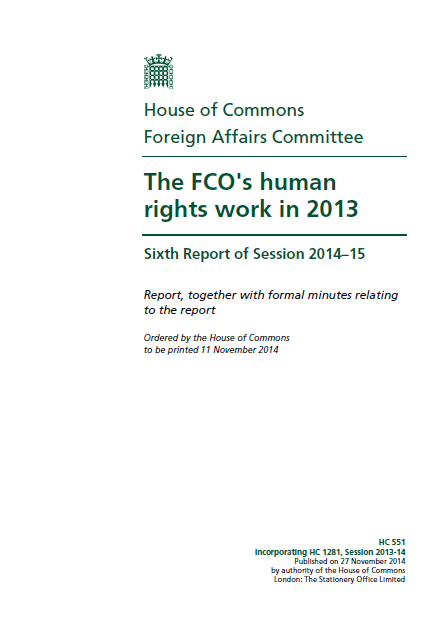The FCO’s Human Rights Work 2013
By Foreign and Commonwealth Office • November 27, 2014In this report, we examine the 2013 Foreign and Commonwealth Office (FCO) Report on Human Rights and Democracy (2013 Report), and highlight some areas of particular concern. Promoting human rights should be a foreign policy priority, but for this to be meaningful, we believe that the Department would benefit from the establishment of clearly defined objectives and benchmarks to measure the outcomes of all of its human rights policies, and further prominence being given to these in the Report.
Countries of concern
The FCO designated 28 countries of concern in its 2013 report, where it judged the gravity of the human rights abuses to be so severe that a particular focus should be applied. We have concentrated our attention on three of these countries: Sri Lanka, Burma, and Israel and the Occupied Palestinian Territories. Favourable trade concessions to the EU market should be removed from Sri Lanka if the Government of Sri Lanka continues to deny the OHCHR investigation team access into the country. The Government should advocate re-imposition of sanctions by the EU if there is no improvement in the human rights situation in Burma. The human rights of Israeli, Palestinian and Bedouin citizens living in Israel and the Occupied Palestinian Territories continue to be of serious concern to the UK.
Women’s and children’s rights
The Preventing Sexual Violence in Conflict Initiative was a key priority for the FCO in 2013. It succeeded in raising international awareness of the problem. We believe that the UK has a duty to track the implementation of commitments made under the Initiative, and we see advantages in this being undertaken by a non-governmental body that reports to this Committee. The UK is lagging behind its OECD partners in reporting how much of its aid expenditure is working towards the advancement of gender equality. The UK should do more to increase transparency of this expenditure. The FCO should demonstrate publicly its support for children’s rights by appointing a child rights expert onto the Foreign Secretary’s Advisory Group on Human Rights.
Freedom of religion or belief
The FCO made the right to freedom of religion or belief a key thematic priority in 2013. A new advisory group on religious freedom was formed in March 2014 to advise the FCO on policy formulation. We recommend that the Government publish the strategy that is being drawn up by the sub-group, specifying what the FCO is trying to achieve and how it plans to spend its funding allocated to project work. The strategy should specify which countries the FCO is targeting, if any, which partners it plans to engage with, and what practical steps it will take to bring about change.
UK’s participation in the Human Rights Council
Since its election onto the UN Human Rights Council in January 2014, the UK has been involved in a number of high-profile issues. Criticisms have been levelled at the UK for not supporting a resolution on the use of drones and not providing access for a UN Special Rapporteur to a site in the UK. In some quarters, this is seen as indicating an inconsistency of approach. We believe both examples set a dangerous precedent for other countries to follow suit, and the decision not to facilitate a request from a UN Special Rapporteur to visit Yarl’s Wood immigration detention centre caused embarrassment to the UK.
Business and human rights
A UK Government Minister said that human rights should not get in the way of developing trade ties with China, and another Minister shared a platform with the President of Uganda promoting investment into the country on the same day that the first prosecutions were coming into court under a draconian law criminalising same-sex relationships. These two examples demonstrate the inherent conflict that exists between promoting UK trade and investment and human rights at the same time. The Government should recognise that this conflict exists, rather than maintaining that human rights and business interests go hand in hand.
Download the full report here.
Tags: Arakan/Rakhine, British Government, Burma Campaign UK, Daw Aung San Suu Kyi, Foreign and Commonwealth Office, Human Rights Violations, Human Rights Watch, Kachin Independence Organization, Muslims, Political Prisoners, President Thein Sein, Rohingyas, Special Rapporteur, US President Barack Obama, Women's League of BurmaThis post is in: Human Rights
Related PostsMyanmar: Free Prisoners of Conscience in Rakhine State End Ongoing Persecution of Rohingya
UN Myanmar Rights Expert: Backtracking on Democratic Space Gains Momentum in Election Year
Myanmar’s Proposed Race and Religion Laws are Discriminatory and should be Scrapped
BROUK Welcomes US Senate Resolution on Rohingya
KIA ဗိုလ္သင္တန္းေက်ာင္းသို႔ ျမန္မာအစိုးရစစ္တပ္မွ လက္နက္ႀကီးျဖင့္ ပစ္ခတ္တိုက္ခိုက္မႈအေပၚ ရကၡိဳင့္တပ္မေတာ္၏ သေဘာထား ထုတ္ျပန္ေၾကညာခ်က္










 All posts
All posts